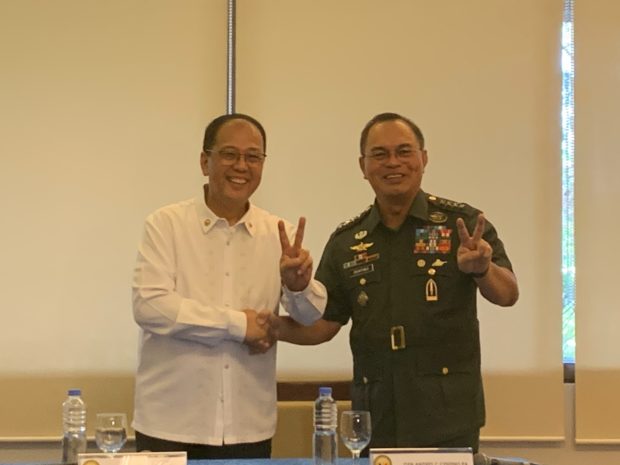
PEACE. Defense Secretary Carlito Galvez Jr. and Armed Forces of the Philippines chief-of-staff Andres Centino did a peace sign during a press briefing in Camp Aguinaldo in Quezon City. This, as Galvez denied that there is unrest in the military establishment over the tenure law, while Centino called the supposed squabbles “birth pains.” INQUIRER.net/John Eric Mendoza
MANILA, Philippines — While denying there is unrest in the military, Defense Secretary Carlito Galvez Jr. on Thursday said the fixed three year term on Armed Forces of the Philippines (AFP) may lead to “stagnation” and “demoralization.”
Galvez was referring to the provision of the Republic Act 11709 setting a fixed term of three years for key officials of the AFP including the AFP chief-of-staff, vice chief-of-staff, deputy chief-of-staff, commanding generals of the Philippine Army and the Philippine Air Force, flag officer in command of the Philippine Navy, unified command commanders, and inspector general.
“Kung three years ang area commander, magkakaroon ng tinatawag na stagnation. Kapag nag-stagnate ‘iyon, ‘yung tinatawag nating promotion cycle, there is demoralization,” he said in a press briefing in Camp Aguinaldo in Quezon City, adding that the AFP is a “dynamic organization.”
(If an area commander has a three year term, there would be what we call a stagnation. When there is a stagnation in the promotion cycle, there is demoralization.)
Galvez also denied any unrest brewing in the military establishment due to the Republic Act 11709, adding that the issues in the law are being resolved.
“There is no truth on the unrest, maybe merong tinatawag nating some valid issues, but we are resolving it now, isa dun yung sinasabi nating some delays on promotion,” he also said.
(There is no truth on the unrest, maybe we have what we call valid issues, but we are resolving it now. One of the issues is the delay on promotion.)
For his part, AFP chief of staff Gen. Andres Centino called the reported squabbling in the ranks over Republic Act 11709 “birthing pains.”
The law was intended to put an end to the so-called revolving-door policy to allow the new AFP leadership a longer period to implement reforms, and institutionalize sound policies. “Revolving door’’ refers to the rapid succession of AFP chiefs who had to step down after serving for a short period.
However, observers noted that the new law would disregard the AFP’s merit-based system and hierarchy.